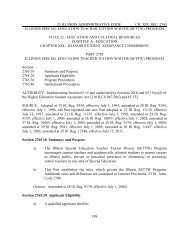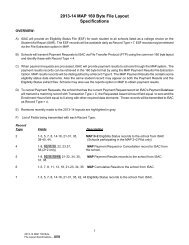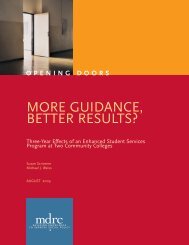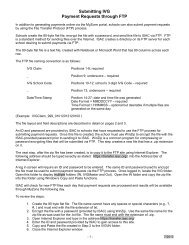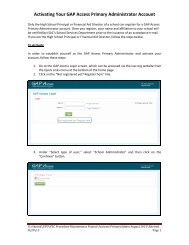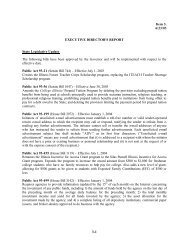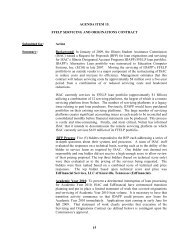High school rigor and good advice: Setting up students to succeed
High school rigor and good advice: Setting up students to succeed
High school rigor and good advice: Setting up students to succeed
You also want an ePaper? Increase the reach of your titles
YUMPU automatically turns print PDFs into web optimized ePapers that Google loves.
One straightforward thing that teachers, administra<strong>to</strong>rs, <strong>and</strong> counselors can do is identify those<br />
<strong>students</strong> who may be at risk of dropping out after their first year of college, <strong>and</strong> <strong>to</strong> follow <strong>up</strong> with early<br />
<strong>and</strong> effective interventions. These signs include:<br />
low SAT/ACT scores or low st<strong>and</strong>ardized test scores<br />
low st<strong>and</strong>ardized math scores<br />
low GPA<br />
parents who have high <strong>school</strong> or less as their highest level of education<br />
School boards play a large part in making sure that college success is a goal for their districts. There are<br />
several things they can do:<br />
Data collection: The first thing is <strong>to</strong> make sure that data is being collected on how well their<br />
graduates perform in college. It is not sufficient <strong>to</strong> just get a student in<strong>to</strong> college, they need the<br />
skills <strong>to</strong> continue <strong>and</strong> obtain a degree. Schools should also moni<strong>to</strong>r middle- <strong>and</strong> high-<strong>school</strong> data <strong>to</strong><br />
identify <strong>students</strong> who may be falling off the tracks <strong>to</strong>ward high <strong>school</strong> graduation <strong>and</strong> college<br />
success so that effective interventions can be provided.<br />
Rigorous curriculum: Schools need the resources <strong>to</strong> provide a curriculum like AP/IB courses <strong>to</strong> all<br />
<strong>students</strong>, but it doesn’t necessarily need <strong>to</strong> be through AP/IB. Many <strong>school</strong>s districts have<br />
augmented their curriculum <strong>to</strong> make sure that their courses mirror the type of challenging content<br />
that AP/IB provide. School boards <strong>and</strong> <strong>school</strong> districts should consider the success of the AP/IB<br />
programs when designing their curriculum. What is it about the AP/IB courses that help <strong>students</strong><br />
persist? Is there something that can be used in other courses?<br />
Academic counseling: Possibly the most surprising finding was the strength of academic advising as<br />
a predic<strong>to</strong>r of persistence. College <strong>students</strong> who reported visiting with advisors frequently had a<br />
much greater likelihood of staying on track than their peers who never did. The lesson <strong>to</strong> colleges<br />
here is clear: policies <strong>to</strong> encourage these relationships can go a long way <strong>to</strong>ward making sure<br />
<strong>students</strong> are on pace <strong>to</strong> earn a degree. But we also believe that academic advising can be a great<br />
benefit when it starts earlier. Middle <strong>and</strong> high <strong>school</strong>s need enough counselors <strong>to</strong> moni<strong>to</strong>r student<br />
progress so they can make sure all <strong>students</strong> are taking the <strong>rigor</strong>ous courses <strong>and</strong> have the s<strong>up</strong>port<br />
they need <strong>to</strong> be successful in them. Counselors also fill an important role in helping <strong>students</strong> plan for<br />
their futures after high <strong>school</strong>, including help choosing a post-secondary institution that best<br />
matches their goals, <strong>and</strong> navigating the college application <strong>and</strong> financial aid processes.<br />
This study was conducted by Kasey Klepfer, an Archer Graduate Fellow at the University of Texas at<br />
Austin, with the guidance of Jim Hull, senior policy analyst for the Center for Public Education, an<br />
initiative of the National School Boards Association. The authors thank Michael Hurwitz, associate policy<br />
research scientist for the College Board, for his very thoughtful review of this paper.<br />
17



